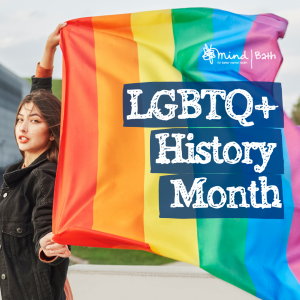LGBTQ+ History Month: Feb 2021
Those of us who identify as LGBTIQ+ are more likely to experience a mental health problem. For many, the pandemic may have made things more difficult. This #LGBTHistoryMonth, we stand in solidarity with all LGBTIQ+ people experiencing mental health problems, past and present.
Anyone can experience a mental health problem. But those of us who identify as LGBTIQ+ are more likely to develop problems like:
Being LGBTIQ+ does not cause these problems. The reasons why those of us with LGBTIQ+ identities are more likely to get them are very complicated. But it is most likely to do with facing things like:
- homophobia, biphobia and transphobia
- stigma and discrimination
- difficult experiences of coming out
- social isolation, exclusion and rejection.
Bath Mind’s service are open to all, and can be accessed by anyone looking for support with their mental health. To understand how Bath Mind can support you, head to What We Do.
If you’re looking for further resources on support and allyship this LGBTQ+ History Month, take a look at our resource section below:
For members of the LGBTQI+ community:
- Mind’s information page on support for LGBTQI+ identifying people
- Consortium’s directory of LBGTQI+ specific resources and support
- Pinktherapy directory on LGBTQI+ specific counselling and therapy (though private sector, not accessible to everyone), also have training for people working with LGBTQI+ people
- Switchboard is a LGBTQI+ specific helpline and online chat (all phone volunteers identify as LGBTQI+)
- Stonewall Infoline
- Uncovering Hidden Histories, Voices and Visibility
For allies:
- Stonewall glossary of definitions of gender and sexual expression
- Becoming an active LGBTQ+ ally by Stonewall
- Pride and Joy, BBC Sounds Episode
Using Gender Pronouns – “For most, their singular and visible gender identity is a privilege. Not everybody has this privilege; those that are referred to with the wrong pronoun can feel disrespected, invalidated, and alienated.”
- You can’t always tell what someone’s gender pronouns are by looking at them. Knowing and using someone’s gender pronouns is a positive way to support the people you work with.” From CultureAmp.
LGBTQI+ History Resources:
- Young Stonewall timeline of major LGBTQI+ events/figures throughout history
- Key dates in the fight for LGBT equality
- LGBTQI History month teaching resources, including a wall map, lesson plans, and presentations
- Stonewall LGBTQI+ awareness month article ‘Inclusive Education for All’
- LGBTQI+ History packs for a range of ages
Posted on: 9th February 2021
